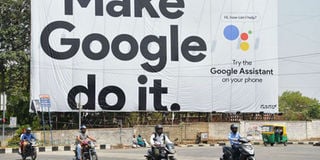There is need for internet that we can control

Indian commuters ride past a Google advertisement poster in Bangalore on April 6, 2018. Twenty years after it was birthed, the web has spread its tendrils so wide and roots so deep that we can’t even start to comprehend it. PHOTO | MANJUNATH KIRAN | AFP
What you need to know:
- There is still much more that we don’t know and Google might be keeping some of the information it considers proprietary.
- But we need better internet — a distributed decentralised internet where you actually own your data and control what can be done with it.
The Cambridge Analytica and Facebook debacle has brought to the fore the dangers of social media and the internet at large.
It is suddenly apparent to many that the issue of privacy needs to be taken seriously.
Facebook’s misadventure is a symptom of everything that is wrong with the internet, especially ‘Big Data’ companies.
Our personal data, including passwords and financial information, is stored on other people’s computers in the cloud or servers owned by companies such as Google, Apple, Facebook and Amazon.
DATA LEAK
Every page you visit on the internet is stored (hosted) by a company that holds the data at a fee and displays it at any moment should it be called upon to do so.
The companies deploy specialised teams to secure this data and ensure uptime.
But with this convenience comes the danger of intrusion by a hacker or government through malicious attack or influence.
Your information can be stolen, leaked or altered without your consent.
This centralised design has been termed the “original sin” of the internet by the Apache Web Server primary developer, Brian Behlendorf.
PRIVACY
Just recently, Apple acquiesced to China’s laws, which compelled it to store cryptographic keys for its Chinese iCloud customers in the country.
China can now use its courts to obtain data from iCloud when it deems necessary.
It could only access through United States courts, which are more stringent regarding privacy and State interference.
The security of your data, to a large extent, depends on how secure these third-party services are; so, how much of your information you let out there is crucial.
If you have a Google account and own an Android phone, Google knows much more about you than you realise — where you live and work, which restaurant you frequent and where you have been.
INFORMATION
Your maps app can even draw coordinates of your movement and show you places you have visited if your location settings are on. It has your browsing history.
With all this data, Google can very well predict your behaviour and deliver advertisements tailored to your taste — the ones you will most likely click on.
If you have enabled Google Photos app, every photo you take with your phone, receive on WhatsApp or email will be synchronised automatically and stored in the cloud.
These can be analysed by Google algorithms and indexed according to places, time or faces.
Yes, Google can collect all photos you and any of your friends appear in and group them together.
It can identify your face and, therefore, knows what you look like. Creepy? You bet.
BUSINESS
And that’s not all; with your permission, it allows third-party apps to access your data.
Some allow you to sign in with your Google account and, with this, get access to your name, email address, gender and even location.
There is still much more that we don’t know and Google might be keeping some of the information it considers proprietary.
Facebook is no different; it, too, has loads of information about you, much of which you share voluntarily.
This includes all your social interactions with friends and relatives.
Someone can also find you on Facebook using your phone number or email address and right then know who you are.
CONVENIENCE
Of course there is always a choice or the illusion of it.
These companies would want you to believe that you are in control and you can tweak your privacy settings to be in control of how much of your information is shared.
The efficacy of these private settings is debatable and, even if they were effective, not many users are technically astute to make informed choices.
We still however need to admit that these companies have made our lives much simpler and better.
Google has indexed the entire internet and made access to information easy and free to some extent.
Facebook has created a more interactive and free society where every person has a voice. All these are good things and very empowering.
ADVERTISE
But there is a trade-off: While we are not expected to pay for these services directly, our information has become the product to be packaged and sold.
This is every advertiser’s Holy Grail and these companies have perfected it.
But then, should we pack and go back to Stone Age?
Of course not! But here is the truth; Facebook or Google has nothing on you that you did not voluntarily give them.
If you can control the source, then you can reduce your vulnerability.
But we need better internet — a distributed decentralised internet where you actually own your data and control what can be done with it.
It will take as a long time to get there but we will. Blockchain is a start.
Mr Orango is a former banker. [email protected] Twitter: @kevorango




